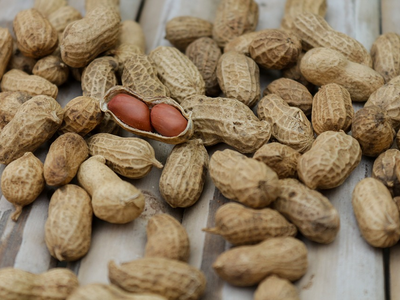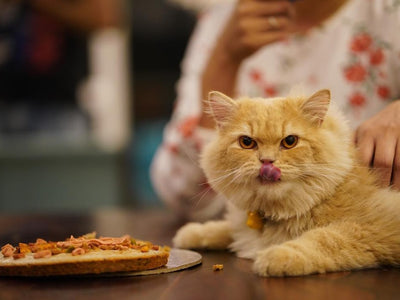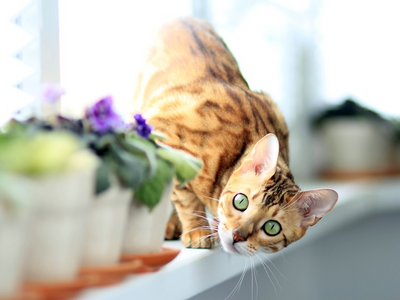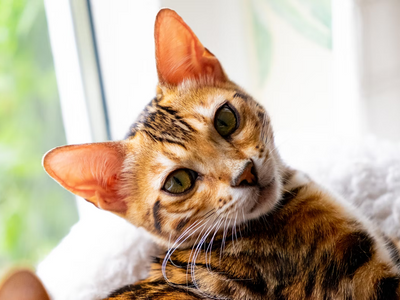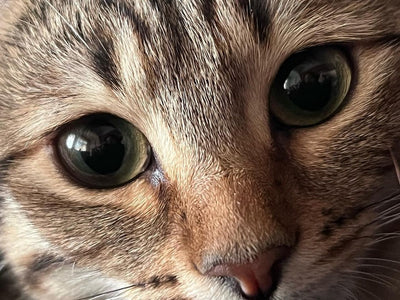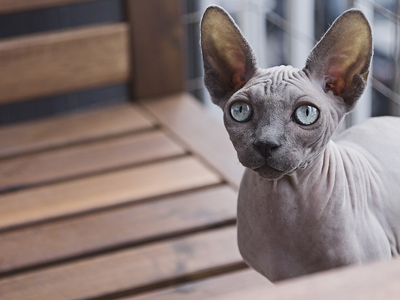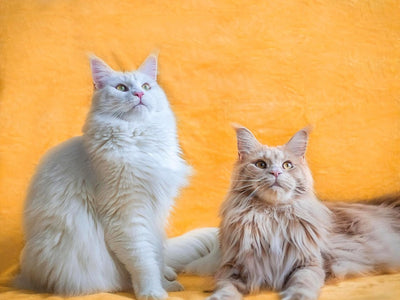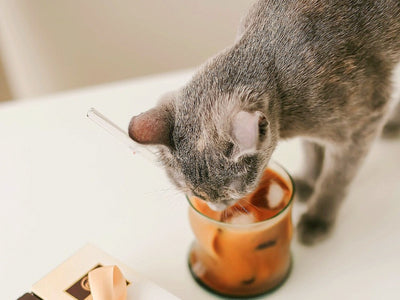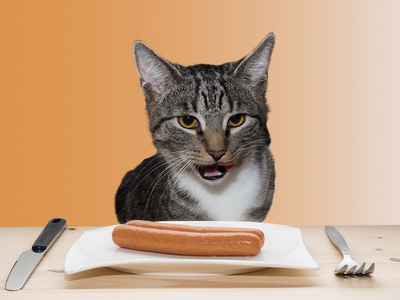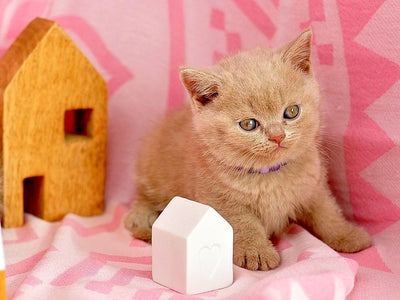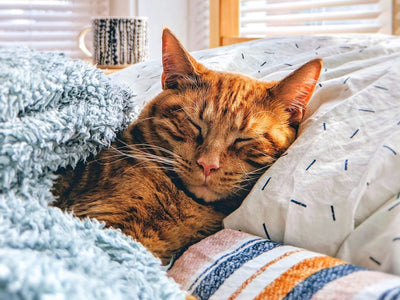28.01.2022
Can cats eat pork—yea or nay?
For thousands of years, felines have feasted on meat, whether by hunting prey or enjoying tailor-made meals (courtesy of loving human companions). A cat’s body is biologically predisposed to a carnivorous feeding pattern, so they can’t thrive on an omnivorous or vegan diet!
Does that mean all meat is good for your feline friend? Can cats eat pork, or are there particular nutritional concerns to keep in mind? Let’s explore the pros and cons of feeding pork to your pet and look into some healthier alternatives. We’ll also provide practical cooking tips for delicious homemade meals!
Should cats eat pork?
In the great outdoors, felines get all their nutrients from fresh prey, mostly rodents or small game. Although they’re not active hunters, domestic cats have the same nutritional needs as their wild cousins and require a high-protein diet to thrive.
Animal protein is vital for your pet’s health because it:
- Contains amino acids, such as taurine and arginine
- Is their primary energy source
- Sustains muscle and bone growth
Taurine is an essential amino acid for your pet’s well-being, sustaining their eye and heart function, reproductive health, and central nervous system. The feline body can’t produce it, so cats must get it from their diet. That is why you need to be particular about their protein source.
Depending on the cut, the protein content in pork can span from ten to 21 grams (per 100 g), which is adequate for an average-sized adult cat (kittens, pregnant cats, and oldtimers may have different energetic requirements). The meat is also rich in vitamin B, zinc, and magnesium—all essential micronutrients.
If pork has the chops (pun intended) to be a solid protein source, why is it mostly absent from most types of commercial cat food? It’s mainly because:
- It’s too fatty—Pork and its derivatives contain loads of saturated fats and sodium that can be harmful to your pet
- There are healthier options—Other meats, particularly chicken and fish, have better bioavailability and less fat
While animal fat is one of the essential nutrients in the feline diet, the fat content in pork exceeds the recommended intake (no more than 20%). If your cat eats pork regularly, they’re at risk of developing several health issues, such as:
- Hypertension
- Obesity
- Chronic kidney disease
- Heart disease
- Sodium poisoning (hypernatremia)
- Hyperthyroidism
Ultimately, the answer to the question “is pork bad for cats” is yes, especially in the long run. Far better protein sources with a superior nutrient ratio can be your cat’s dietary staple.
Can cats eat pork chops?
Giving your cat whole pork chops is dangerous! Whether cooked or raw, the bone can break into smaller pieces and lodge in your cat’s throat. Even if they don’t choke, the shards can damage their digestive tract when swallowed.
A widespread misconception is that chewing on bones helps cats maintain their oral hygiene. Not only is the practice unhelpful, but it can also provoke dental problems. As your cat’s chewing, tiny pieces of bone can get stuck between their teeth and cause gum inflammation. If you have a breed prone to dental diseases, like a Persian, Burmese, or Siamese cat, get a chew toy or give them cat grass instead.
Are the meaty parts safe for cats? Loin chops are the leanest pork cuts, so you can give them to your pet as a treat. Before serving, make sure to cook the strips thoroughly because pork can be full of pathogens, most notably worms. Also, even the leanest parts contain more fat than chicken or fish, so don’t go overboard—once every few months is more than enough.
Can cats eat cooked pork?
If you want to use pork as an occasional treat, cooking the meat is the safest option. Raw pork contains harmful parasites, such as roundworms and tapeworms, potentially lethal to cats.
Highly processed variants, like bacon and pork rinds, are unhealthy because of the high sodium and saturated fat content. Ham is a safer option but in small amounts. You can use it as a taste enhancer because cats love it.
By slow cooking the pork, you’ll get rid of the pathogens and preserve most of the original bioavailability. Here are some tips for preparing the meat at home:
- Only use organic or high-quality meat cuts—Avoid processed meat that contains additives or preservatives. While the added chemicals may extend the product’s shelf life, it compromises the overall quality (which is why you won’t find them in Untamed meals)
- Remove the bones—Before you cook the pork, make sure to remove the bones. If you don’t debone the meat, your cat could choke on the shards
- Do not season the meal—Seasoning the food can give your cat an upset stomach and even result in food poisoning. Besides herbs and spices, you should also avoid particular veggies (e.g., garlic and onions) that are toxic to cats
- Cook thoroughly—Make sure the pork is entirely cooked before serving it to your cat. If necessary, use a thermometer to check the temperature. To preserve the meat’s nutritional value, it’s best to prepare it in a pressure cooker and use water instead of oil
- Slice it into bite-sized pieces—Once the pork is cooked, wait for it to cool naturally (don’t put it in the fridge because it might spoil). Slice it into smaller pieces and check for bones before serving it to your cat
What should I feed my cat instead of pork?

Saturated fats can undo the positive effects of protein. That’s why Untamed uses lean meat cuts for each recipe! Our meals are made with chicken and fish whole meat for ultimate nourishment.
Image (c) Untamed
Pork isn’t an adequate protein source for cats because of the high sodium content. Even the leaner meat cuts, such as loin chops, are fat-heavy, so it’s best to look for healthier alternatives.
Chicken is most commonly used in commercial cat food, and for a good reason. Besides being rich in animal protein, it also contains essential micronutrients, such as:
- Selenium—The trace mineral strengthens your cat’s immune response and keeps their fur healthy. If you have a breed that sheds a lot, like a Ragdoll or a Raggamuffin, feeding them chicken can help control the hair loss
- Phosphorus—Phosphorus is essential for your cat’s bone development and heart and liver function. Overconsumption can sometimes lead to kidney disease (especially in older cats), but if they get the mineral naturally, in controlled portions, there’s nothing to worry about
- Vitamin B6—The vitamin sustains the glucose release in your cat’s metabolism, preventing feline diabetes. It also improves their kidney function
Fish is another popular ingredient because it’s hydrating and high in protein and vitamin D. Unlike pork that’s saturated with unhealthy fats, fish only contains essential fatty acids—such as omega-3 and omega-6—that:
- Prevent skin disease
- Help with inflammation
- Sustain wound regeneration
- Minimise shedding and sustain fur growth
- Reduce the risk of tumours
As for snacks, check out the table below for some taurine-heavy treats:
|
Meat |
Taurine content per 100 grammes |
|
Chicken (dark meat) |
Up to 170 mg |
|
Turkey (dark meat) |
Up to 306 mg |
|
Scallops |
Up to 827 mg |
|
Mussels |
Up to 655 mg |
|
Clams |
Up to 520 mg |
|
Carp |
Up to 868 mg |
|
Tilapia |
Up to 927 mg |
|
Salmon |
Up to 94 mg |
|
Cod |
Up to 120 mg |
|
Tuna |
Up to 964 mg |
Wet vs. dry food
Since meal-prepping is time-consuming, most cat parents opt for ready-made products. The two most popular variants are wet and dry cat food.
Semi-moist and moist food can come in various flavours (most commonly chicken and fish) and different textures, such as gravy, pate, shredded meat, etc. High-quality products are carefully designed to follow the feline natural diet, meaning they contain plenty of:
- Moisture
- Animal protein
- Healthy fats and fatty acids
- Natural vitamins and minerals
Since cats primarily hydrate through their meals, the high moisture content in wet food (78%) is the key to their well-being. Chronic dehydration can lead to numerous health problems, such as constipation, irritable bowel syndrome, kidney failure, and bladder stones, so your cat will do better on wet food.
Dry cat food is heavily processed, so the water content is insufficient (only 10%). Kibble is also highly caloric because it’s made from a mixture of meat, veggies, and grain. The excess carbs could result in an unhealthy weight gain, especially in newly neutered cats who often have an increased appetite.
Dry biscuits are helpful in the case of malnutrition recovery, particularly in older cats whose eating habits change with age. Still, in terms of bioavailable nutrients, kibble is inferior to high-quality wet food.
Some cats develop a preference for biscuits. It might be due to the rough texture or because it was the first solid food they tried. If your kitten is refusing to eat wet food, put them on a mixed diet to keep them hydrated and gradually decrease the amount of kibble with each serving.
Looking for the ultimate protein diet? Get Untamed and see your cat thrive!
Do you want to treat your cat to delicious meals without worrying about their health? Untamed is the feline superfood you were looking for! Our nourishing recipes will ensure your feline companion has a long and fulfilling life.
We’ve worked hard to come up with the ultimate feline diet. Each Untamed meal is:
- Full of protein—The protein content in a single serving of Untamed food is twice the industry standard. We don’t use plant protein, meat derivatives, or other useless or harmful substances—only the best animal protein for our feline delicacies
- Made with whole meat—We use premium meat cuts in our tasty and nourishing recipes. Each ingredient is of human-grade quality, and the final product is packed with bioavailable nutrients essential for your cat’s health
- Vet-formulated—Veterinarians designed our meals to meet your cat’s unique nutritional needs. Each dish is complete and balanced and free of all common allergens
- Ethically produced—We run ethical and cruelty-free operations. Untamed packaging is 100% recyclable. We work with sustainable suppliers and leave a neutral carbon footprint
- Impossible to resist—Untamed meals are delicious and nourishing. Your fussy eater will be swept off their paws with every dish
We gently steam our food to keep the original bioavailability of the ingredients. Your cat will start feeling the Untamed effect soon after finishing their first dish! Check out the details in the table below:
|
Timeline |
Health benefits |
|
Within a week |
|
|
After two months |
|
|
Within four months |
|
|
Life-long benefits |
|
Check out our delicious recipes!
Untamed food is low-fat, low-sodium, and all protein! Our dishes are made with premium meat cuts, such as:
- Chicken breast and liver
- Duck breast
- Salmon fillet
- Tuna steak
- Sardine and mackerel fillet
Our recipes are healthy without sacrificing the taste! The most popular products include:
- Chocka Chicken in Jelly—Super moist chicken breasts in jelly for kitties with sensitive tummies
- Tuck-in Tuna in Jelly—Dolphin-safe tuna simmered in jelly and delicious fish broth
- Chocka Chicken with Duck in Jelly—The gourmet poultry platter, human-grade chicken breast spiced up with whole duck meat, served in jelly
- Tuck-in Tuna with Salmon in Jelly—Delicious whole meat tuna in scrumptious jelly served with top-notch salmon fillet
- Chocka Chicken in Gravy—A perfect dish for the sensitive feline, made with shredded chicken breast only and steamed in natural gravy
Take the Untamed online quiz and make the ideal meal plan for your furry friend!

If you’re looking for a feline superfood, Untamed’s Tuck-in Tuna is a single-source protein recipe made with premium whole meat tuna!
Image (c) Untamed
How do I join the Untamed community?
Becoming a member of the Untamed clowder is super convenient! Order a trial cat food pack online and treat your kitty to exciting feline delicacies every day by following these steps:
- Visit our Try Now page
- Let us know about your cat’s life stage, taste preferences, and allergies
- Pick a meal plan and submit your order
We'll deliver the goods within a day, with no additional shipping fees! Once your cat chooses their favourites, you'll start receiving monthly deliveries of delicious Untamed food.
Our monthly cat food delivery service caters to your changing needs—if you want to modify, postpone, or cancel your order, you may do so from your account.

If it tastes as good as it smells, you’ve got a deal, human!
Image (c) Untamed
Raw pork for cats—why it’s dangerous
The so-called “bones and raw meat” (B.A.R.F.) diet has been popular among cat parents for decades. It should mimic the natural feeding pattern of wild cats by serving unprocessed, uncooked ingredients or commercially sold raw food.
While a raw diet can help with some chronic diseases (e.g., diabetes), the risk of bacterial infections is too high. Uncooked meat, raw eggs, and unpasteurised milk contain pathogens, such as salmonella, listeria, and E. coli, that can be detrimental to cats. Kittens and seniors are especially susceptible and will most likely die if infected.
Contamination can occur directly, i.e., through consumption or by coming into contact with a contaminated surface. If your cat loves to sniff around, make sure to clean the dishes and utensils after handling raw food thoroughly.
Raw pork is dangerous to cats and their owners. The meat contains various food-borne microbial pathogens that can spread from felines to humans.
If cats eat pork regularly, they can contract a worm infestation, either Taenia solium (tapeworm) or Trichinella (roundworm). A parasitic infection can go unnoticed for weeks, but some common symptoms include:
- Diarrhoea and bloody stool
- Swollen abdomen
- Vomiting (vomit or even worms)
- Skin lesions
- Weight loss
- Pale lips and gums
- Lethargy
What other foods are harmful to cats?

Hey, if I ask really nicely, will you give me some milk? Pretty pleeeease!
Source: avante
Here’s a list of other potentially harmful food items that could hinder your cat’s health:
- Allium vegetables—Garlic, onions, shallots, and chives are extremely harmful to cats. When ingested, the allium attacks the feline’s red blood cells, eventually destroying them and causing kidney failure. If you’re making homemade soup or broth for your pet, avoid these toxic vegetables at all costs
- Dairy products—Cats are lactose intolerant, meaning they don’t have the enzymes necessary for digesting milk, cheese, or other dairy products. You can give them a sip of yoghurt or lactose-free milk, though. Foster kittens should be given a milk replacer formula instead of products from the human food supply chain
- Grapes and raisins—Some high-fibre fruits like strawberries, bananas, and apples are feline-friendly, but grapes are off-limits. The sugary fruits can give your cat indigestion, and regular consumption can even lead to kidney failure
- Citrus fruits—The citric acid in oranges, lemons, clementines, limes, and grapefruits is too much for your cat’s metabolism. If you give them citruses as a regular treat, their kidneys might shut down
- Caffeine—Chocolate, tea, coffee, and other caffeine-based products can poison your cat. The symptoms include heart palpitations, restlessness, tremors, and breathing difficulties
- Raw yeast—Cats can’t digest yeast, and the bulk of it remains in their gastrointestinal tract causing bowel obstruction, bloating, and general discomfort. In some cases, the yeast can ferment and produce alcohol, which is toxic to cats. Even fully-baked bread can be hard on their stomachs, so it’s best to avoid dough altogether
Check out our other guides to what cats can or cannot eat:
|
|

![Associated image for What human food can Sphynx cats eat? [Comprehensive list]](http://untamed.com/cdn/shop/articles/what_human_food_can_sphynx_cats_eat_Featured_400x300_crop_center.jpg?v=1648705074)
